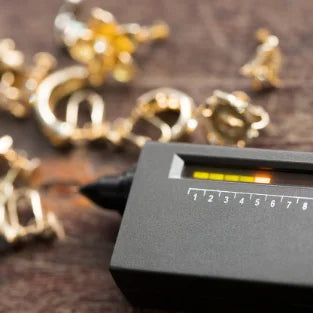Top 10 Red Flags to Watch Out for When Purchasing Diamonds Online
Buying diamonds online can be a convenient and exciting experience but also a decision that requires careful attention.
With many online diamond retailers, it’s easy to fall for misleading deals and fraudulent practices.
Whether you’re looking for an engagement ring or a diamond for a special occasion, knowing what to avoid will help you make a confident purchase.
This guide highlights the top 10 red flags to watch out for when purchasing diamonds online and provides essential tips to ensure you’re making a secure and smart investment.
What are the Top 10 Red Flags to Watch Out for When Purchasing Diamonds Online?
We’ve rounded up the Top 10 Red Flags to Watch Out for When Purchasing Diamonds Online to highlight the pitfalls buyers often fall prey - so you don’t have to.
1. Unrealistically Low Prices
It probably is if a diamond price seems too good to be true. Some retailers lure customers in with prices significantly lower than market value, often indicating lower-quality diamonds or counterfeit stones. Be cautious of steep discounts or limited-time "sale" prices without proper certifications to support the claims. Tip: Compare prices from multiple reputable diamond sellers to better understand the average cost. Don’t rush into purchasing a diamond because of a tempting price tag.
2. Lack of Certification from Trusted Labs
Certification is a must when purchasing a diamond. If an online store doesn’t offer diamonds certified by a recognized and independent grading authority like GIA (Gemological Institute of America) or IGI (International Gemological Institute), it's a big red flag. These certifications guarantee that the diamond has been evaluated by professionals and graded for its quality. Tip: Always ask for a GIA or IGI certificate and verify the certificate number with the respective lab for authenticity.
3. No Clear Return or Exchange Policy
A reputable online diamond retailer should have a transparent and customer-friendly return or exchange policy. Be cautious if the website does not mention its policies or offers vague details. You should be able to return or exchange a diamond if it doesn’t meet your expectations or arrive as described. Tip: Ensure the store provides at least a 30-day return or exchange window, and read the fine print carefully before purchasing.
4. Vague Product Descriptions
When buying diamonds online, you rely on product descriptions to understand the diamond’s quality. If the website provides little to no details about the 4 Cs (cut, color, clarity, and carat weight) or offers vague terms like “excellent quality” without specifics, it’s a major red flag. You need to know precisely what you’re buying. Tip: Look for sites that provide comprehensive information, including a full breakdown of the diamond’s grading for each of the 4 Cs.
5. Unprofessional or Unclear Customer Support
Before making a diamond purchase, try contacting the retailer’s customer service with a few questions. If they take too long to respond or provide unclear, vague answers, this could indicate a lack of professionalism. A trustworthy diamond seller will have knowledgeable representatives who can answer your questions confidently and guide you through the buying process. Tip: Look for online retailers offering live chat or phone support, so you can easily contact a specialist if needed.
6. No Customer Reviews or Negative Feedback
Customer reviews provide insight into the retailer’s reputation. A website with no reviews or a disproportionate number of negative reviews is a red flag. Authentic reviews from previous customers can give you peace of mind that the company delivers on its promises. Tip: Use platforms like Google Reviews or Trustpilot to check the retailer’s overall rating and read detailed customer feedback.
7. Pressure to Buy Immediately
Be cautious if a retailer pressures you to make a purchase quickly by offering time-sensitive discounts or claiming that there’s only one diamond left in stock. High-pressure sales tactics often rush customers into buying without proper research. Tip: Take your time when purchasing a diamond online. Never feel rushed or obligated to buy under pressure. A legitimate seller will respect your decision-making process.
8. Suspicious or Insecure Website
Security is crucial when buying diamonds online, especially since this can be a high-value purchase. If the website looks outdated, unprofessional, or lacks SSL (Secure Sockets Layer) encryption—look for a padlock icon next to the website address in your browser—this is a major red flag. Tip: Ensure the website uses secure HTTPS connections and look for security trust seals like Norton or McAfee. These are signs that your personal and payment information is safe.
9. No In-House Gemologist or Expert Consultations
A reliable online diamond retailer will offer expert advice through in-house gemologists or consultants. If the website doesn’t provide options for consultations or personal guidance, you may end up with a diamond that doesn’t meet your expectations. Tip: Choose retailers that offer free consultations with gemologists who can walk you through the diamond-buying process, help you understand the 4 Cs, and select the perfect stone for your needs.
10. No Guarantee or Warranty
A diamond is a significant investment, and you should be able to protect it. If a retailer doesn’t offer a lifetime guarantee or a warranty that covers maintenance services like resizing, cleaning, and inspections, this is a red flag. A good warranty shows that the seller stands behind the quality of their diamonds. Tip: Ensure the retailer offers a lifetime guarantee or warranty that includes care services, such as free annual cleanings or inspections.
Get Expert Advice Before You Buy
Want to verify the credibility of a diamond seller? We're here to help you make the right choice.
Book A Free Consultation today
